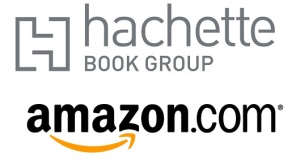Wednesday, August 20, 2014
Hachette vs Amazon - The Flip Side
Now for Part Two – The Flip Side.
I find it interesting that Hachette asked their authors not to talk about the dispute between Hachette and Amazon because Hachette wants to control the message – only have one voice for their side of the dispute. That’s actually a good idea, and I’m sure their lawyers are grateful considering they’re still in negotiations. Although the world is a cynical place and no doubt many see it as akin to a gag order, especially when Amazon has gone the exact opposite route and sent letters to its indy authors inviting all of them to put in their two cents – after carefully telling them what Amazon perceives the problem to be and telling them what talking points to address. Authors clearly cannot be trusted to think about these things for themselves. Ahem.
I posted a link to Amazon’s letter and, while Hachette has made their own statements, I’ll point out some authors aren’t siding with Amazon. Clearly some can think for themselves. Oops. Here’s a link to that letter. It’s worth looking at a list of what some notable authors are crying foul over.
Now, a point was made a week ago when the Authors United letter came out picking apart the argument citing that books from Amazon’s presses aren’t sold at all bookstores, so their authors are as much a victim as Hachette’s and the letter is hypocritical. No. It’s true that books from Amazon’s presses aren’t sold in all bookstores, but that’s a matter of distribution. When you choose a publisher, you are limited to that publisher’s distribution options. What the letter is referring to is a bookstore or retailer having the book on the shelf, having the customer available, and trying to convince the customer to purchase something else instead. That is what Amazon has been doing to some of Hachette’s authors because of this dispute.
Now Hachette, in their ever polite, understated way (which proves my point last week that they’re not living in today’s business world) says the dispute is over Amazon seeking more profit and market share at the expense of the authors, bookstores, and publishers. I hesitate to point this out, but they’re a business. You’re going to have to make a more forceful statement than that to get my attention.
And let’s loop back around to eBook pricing that Amazon says this is over. Specifically, let’s look at allegations of collusion. Amazon didn’t have to dig deep for that little gem, they were involved in the lawsuit, having brought the eBook pricing issue to the DOJ’s attention. Yes, the DOJ went after the Big Six (remember, it’s really only five) but the publishers were the sidekicks in this story, the ringleader was – Apple.
Do I believe the WSJ story? Yes, I always did. Sorry, Hachette, but the Big Six are dinosaurs in their thinking, I’ve been pretty clear on that point, and Apple is historically ruthless in theirs. Apple has been dragged into court many times before for their business practices, this isn’t a surprise. Hachette was one of the publishers who settled, by the way. They learned their lesson, paid their fine, it’s in the past.
By bringing it up, Amazon makes you not like them. Just like Authors United paints a bad picture of Amazon by telling you about what they’re doing to Hachette’s authors. It’s a PR war.
Who’s right? I don’t know everything that is in dispute between Hachette and Amazon. This is about more than eBook prices, or at least it better be. This is about control. In that context, I have to side with Hachette.
Hachette is, in a way, representing the Big Six, and by extension, the publishing industry. Publishing houses, and the extended support staff that surround them, provide direction and structure for the industry as a whole. Even indy authors benefit from it. Lessons and information are frustratingly unidirectional, it seems, but it’s better than not having the information at all. Hachette has a history with publishing. They need to update their thinking, but they understand why books are important to society. Quality is important to them, authors and readers mostly trust and understand it, even if there are growing pains at the moment.
Amazon is a business, period. Granted, they could do less to encourage a quality product, but it wouldn’t take a lot of effort to do so much more. Taking a few tips from competitors such as Smashwords, B&N, or major publishers, could help them and their authors offer a more consistent quality product for their customers. They’re so concerned with pumping out books, making it easy for anyone to publish almost anything and getting their 30-70% that they don’t care when their authors publish a book two chapters at a time and call it a series.
I publish with Amazon. I don’t want them in control of the publishing industry, I don’t want that future. They know how to do business, but not how to promote literacy or artistic expression. There’s no place for literary agents in an Amazon-based future. Brick and mortar stores, then libraries, will shrivel and many will die. Many already have, but more. We’ll lose a lot of young readers when there’s nowhere for them to go to browse and see what simply catches their eye. Children need the tactile feel of books to begin to love them. Toddlers like to touch things and be visually stimulated by the colors and pictures. They can’t get that online. They’ll graduate to eBooks later.
Amazon is a business and it has its place. That place is not directing the future of literature. Leave that to publishers.
Subscribe to:
Post Comments (Atom)

No comments:
Post a Comment